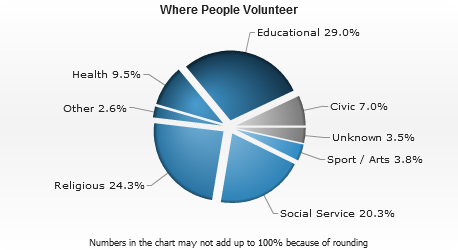Need a Job? Study Says Volunteering First Can Help
/
If you are unemployed, it pays to volunteer. That is the finding of a new analysis by the Center for Economic and Policy Research, tracking individuals out of work who chose to volunteer, and the impact it had on their search for employment.
The report, “Does It Pay to Volunteer: The Relationship Between Volunteer Work and Paid Work,” estimates non-working individuals’ probability of being employed a year later if they volunteered during the 12-month period. Pooling three years of data from the Current Population Survey (CPS) Volunteer Supplement covering the period ending in September of 2011, the analysis found a positive volunteer effect on the probability of employment for persons who were not employed and volunteered for more than 20 hours per year.
For example, the employment rate for non-working persons who volunteered between 20 and 49 hours per year was 57 percent higher than the rate of non-volunte ers. And controlling for personal characteristics such as age, gender and ethnicity, there was a substantial increase (6.8 percentage points) in the probability of employment for persons who volunteered between 20 and 99 hours per year.
ers. And controlling for personal characteristics such as age, gender and ethnicity, there was a substantial increase (6.8 percentage points) in the probability of employment for persons who volunteered between 20 and 99 hours per year.
In Connecticut, among the many ways to volunteer - most with local community-based organizations - the United Way has developed a web site, www.volunteerConnecticut.org , to match interested individuals with volunteer opportunities. The Connecticut Association of Nonprofits, at www.ctnonprofits.org, also has a website devoted to volunteering.
The latest statewide data for Connecticut, complied by the Corporation for National & Community Service using 2011 data, indicates that volunteerism is considerable across the state:
- 28.5% of residents volunteer, ranking them 22nd among the 50 states & Washington, DC.
- 29.3 volunteer hours per resident.
- 72.8% do favors for their neighbors.
- 793,710 volunteers.
- 81.7 million hours of service.
- $1.8 billion of service contributed.
In the survey, many volunteers did not volunteer in the professional field in which they were seeking employment. This suggests that even without accumulating the relevant human capital for the fields in which they were seeking employment, volunteering may have signaled to prospective employers that the applicant possessed desirable qualities such as motivation, creativity and reliability.
Thus, volunteering could be particularly useful for job applicants with little prior experience such as recent college graduates or persons attempting to re-enter the labor market after a period of joblessness. The data did not indicate that volunteering has a significant impact on wage growth of the typic al person.
al person.
For purposes of the survey, a volunteer was defined as person who performed unpaid volunteer activities over the previous 12 months through or for an association, society or group of people who share a common interest. Volunteering in an informal manner, such as helping an elderly neighbor is not included in the survey. Unpaid work, including internships for for-profit employers, is also not considered volunteer work, while some other types of unpaid internships may be included, if the person considered it volunteering rather than work.































